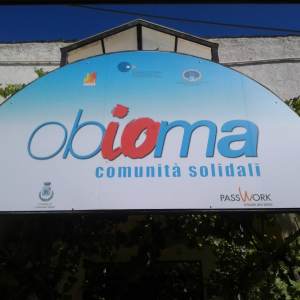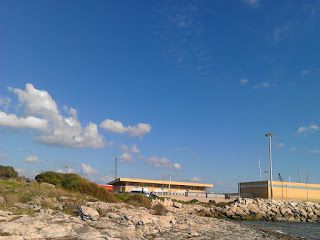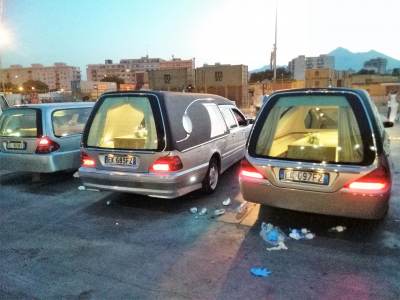A Good Example For Once
For once, a good example of migrant reception. A report of a visit to the “Obioma” SPRAR centre at Canicattini Bagni
According to the figures provided by the website of the SPRAR central office,* there are only ten centres for refugees with physical of mental disabilities in Sicily. One of these projects in particular stands out for being dedicated almost entirely to women – both with and without children – with mental disabilities, frequently victims of human trafficking. We decided to visit the project, located in the town of Canicattini Bagni, around 23km from Syracuse.
It’ is a Thursday morning, and despite the Spring temperature, the sky is clear and the sun lights up the street like a Summer afternoon from a poem by Montale. Having parked on the edge of town, I take the road that leads town to the “Obioma” centre, the SPRAR centre managed by the cooperative “Passwork”. The cooperative also manages a hostel for asylum-seeking unaccompanied foreign minors in Canicattini Bagni, and another SPRAR centre for adults in Floridia, in the same province.
Only a sign reading “Obioma” distinguishes the centre from many of the other small houses in the vicinity. The project headquarters in a building on two levels, set back from the street by a small garden and a gate which was half-open when I arrived. As soon as I entered I was taken to the administrative office, where Paolo – psychologist and the centre’s director – was in the middle of a conversation with one of the house’s residents. After a brief presentation, the young women left us to take a walk, while we sat and chatted in the office. Paola spoke freely and explained the centre’s situation to me in minute detail.
The house currently hosts not only women with mental difficulties but also small family units – each made up of mother, father and two children – that live in two apartments with shared communal areas on the top level of the building. The ground floor, on the other hand, contains not only the administrative office but also an shared apartment for the other beneficiaries of the project. This consists of a large kitchen-dining room, a sitting room with Wifi and TV, an internal garden, two bathrooms and four bedrooms, each one equipped for two or three young women.
The director tells me that at the moment there are 18 residents, between 18 and 33 years old, – all of them either asylum seekers, holders of humanitarian or international protection, or engaged in appeal processes – originally from Nigeria, Gambia and Mali. This composition is extremely recent because there have been several transfers in recent months. Some of the young women have only recently arrived, while others have been here for two years, almost at the end of their period within “personalised, holistic” reception, as the SPRAR manual defines the system. “The young women have very strong characters”, Paola tells me “and sometimes there are fierce arguments over nothing.” But despite the sometimes agitated atmosphere in the house, due to each person’s personal history, Paola confides in me that “when we brought them in, each of them was in a terrible condition, but today it is really satisfying to see how they have found their energy.” And in truth there is motion in the housefhol; at the moment they are preparing for a theatre rehearsal, a project which the centre’s residents have organised for some years in collaboration with the middle and high schools in Canicattini Bagni.
Around lunch time the office became more busy, with the young women entering and exiting and asking for utensils, bread and medicine.
Being a SPRAR centre for vulnerable persons, the beneficiaries are followed by a psychiatrist and some of them follow a pharamacological therapy. “They all went through Libya”, Paola tells me “and in some cases they have been victims of human trafficking” The diagnoses of the problems experienced by the centre’s residents range from “ordinary” depression to post-traumatic stress; some have recieved involuntary treatment.
The majority of the staff are women: five tutors, an interpreter, a psychologist (as well as the director, who has the same qualification), an assistant and a health worker. There are three security personnel at night, as well as a tutor on shift. The centre collaborates with a legal assistat and a psychiatrist, who supervises both the resident and the staff, in order to guarantee mental health within such an intensive working environment.
The cooperative “Passwork” is also in partnership with the “Proxima” cooperation, the International Migration Office’s anti-trafficking organisation and occasionally with “Project Silver”, which organises trainings for the tutors. After several years of use, the building – and the kitchen in particular – is set to be renovated from July.
The sound and smells that come from the kitchen provide the opportunity to ask about some of the more practical aspects of the organisation, such as the provision of meals and the distribution of clothes and pocket money. A cook prepares lunch and dinner throughout the week to the residents of the ground gloor, and at the weekend they cook for themselves The families are provided with shopping (the equivalent of €40 per week) based on their requests and effected independently. The €2.50 daily allowance is paid monthly to PostaPay bank accounts, and €10 “Lyca” phone credit is handed out once a month along with a sanitary kit; at the change of the season, each beneficiary is accompanied to buy new clothes.
While we’re talking, one pf the tutors returns with a young woman from a job interview in Syracuse. It seems that the interview went well and the young is woman is very satisfied: employment would be a way of her gaining independence from the project and finally (re)acquiring her autonomy after a long journey. This is not the only experience of initiating a project of employment by the centre. All of the women are learning to speak Italian, or have already learnt it. Some of them have gained their middle school certificates through the local adult education facility* and are studying to pass their driving license. Others have taken part in regional training courses to help them begin work: the most recent workshop, on chocolate production, took place a short while back in Modica. The centre’s residents have different projects however, from gastronomy to beautification.
One of the main obstacles for independence, Paola explains, is that working activities often do not provide the necessary income to guarantee self-sufficiency: there have already been cases of seemingly-secure contracts being dropped, or others in which the women earn €300 – €400/month, not enough to gain independence. There are not many opportunities for work in Canicattini Bagni, and some of the women look towards Syracuse to find employment.
Over the course of the day, Canicattini Vagni and Syracuse are connected by various buses, which the women take to go and work or simply to pass the time in the city and meet friends of carry out chores (in accordance with communicating their movements), sometimes alone and sometimes accompanied by staff. Though small, Canicattini Bagni provides the centre’s residents with opportunities to walk around and meet up, given that the young women attend the local adult school and the gym. One of the men works as a petrol station attendant and also works in the countryside, and all of them have been invited to take part in various festivals in the town.
Our chat over, Paola took me on a brief tour of the apartment before returning to the office, leaving me free to see the rooms and speak with the young women. There was a busy atmosphere: some were cooking – the cook is off sick this week – some were preparing to go out, others spoke on the phone or ate. The women were shy when I tried to open a conversation with them, but I managed to talk a little with ‘F.’, who was cooking rice with Nigerian stew, who told me that she has lived at ‘Obioma’ centre for two years now, and has just receive a form of protection, but the final hurdle remains between her and independence: the difficulty of finding a decently-paid job in Italy.
The women taking part in the theatre rehearsals have gone, accompanied by a member of staff, and I took advantage of the quieter atmosphere to enter one of the rooms, where I found ‘V’, the young girl of the group, and I stopped to play with her for a while. All of the residents take care of ‘V’, not only her mother. She laughs, greets me, cackles loudly, but she still cannot talk. I continue walking around; three of the women and the upper-floor residents come and go from the office, speak with Paola, the interpreter, a tutor. In a half-darkened room I find a young woman who has taken ‘V’ with her for the moment, and is eating in her bed. We speak a little. ‘P,’ tells me that sometimes there are arguments between the women, but they resolve them. She explains that she’s still waiting for a decision from the Territorial Commission about her documents, and for his reason she cannot make any plans or really imagine a future.
Parlare con lei mi conferma che la convivenza in un appartamento condiviso, con i problemi che ciascuna di loro ha, non è facile. L’essere molto impegnateSpeaking with her confirms my understanding that living in an apartment, with all the problems that each person brings with her, is not easy. And being busy does not necessarily mean that the women feel they have reached their goal. The waiting for documents hinders the possibility to make long-term plans, while it is exactly the ability to plan, to imagine connections between the present and the future, that can provide the strength to deal with the past, and bring a sense of everyday victories.
When I finally say goodbye to everyone and leave the gate, I realise that for a few hours I had forgotten the world outside, thanks I believe to the fact that this morning the atmosphere in the apartment was filled with movement.
Vittoria Fiore
Borderline Sicilia
*SPRAR = Refugees and Asylum Seekers’ Protection Service
* “adult education facility” = CPIA (Centro provinciale per l’istruzione degli adulti)
Project “OpenEurope” – Oxfam Italia, Diaconia Valdese, Borderline Sicilia Onlus
Translation by Richard Braude




